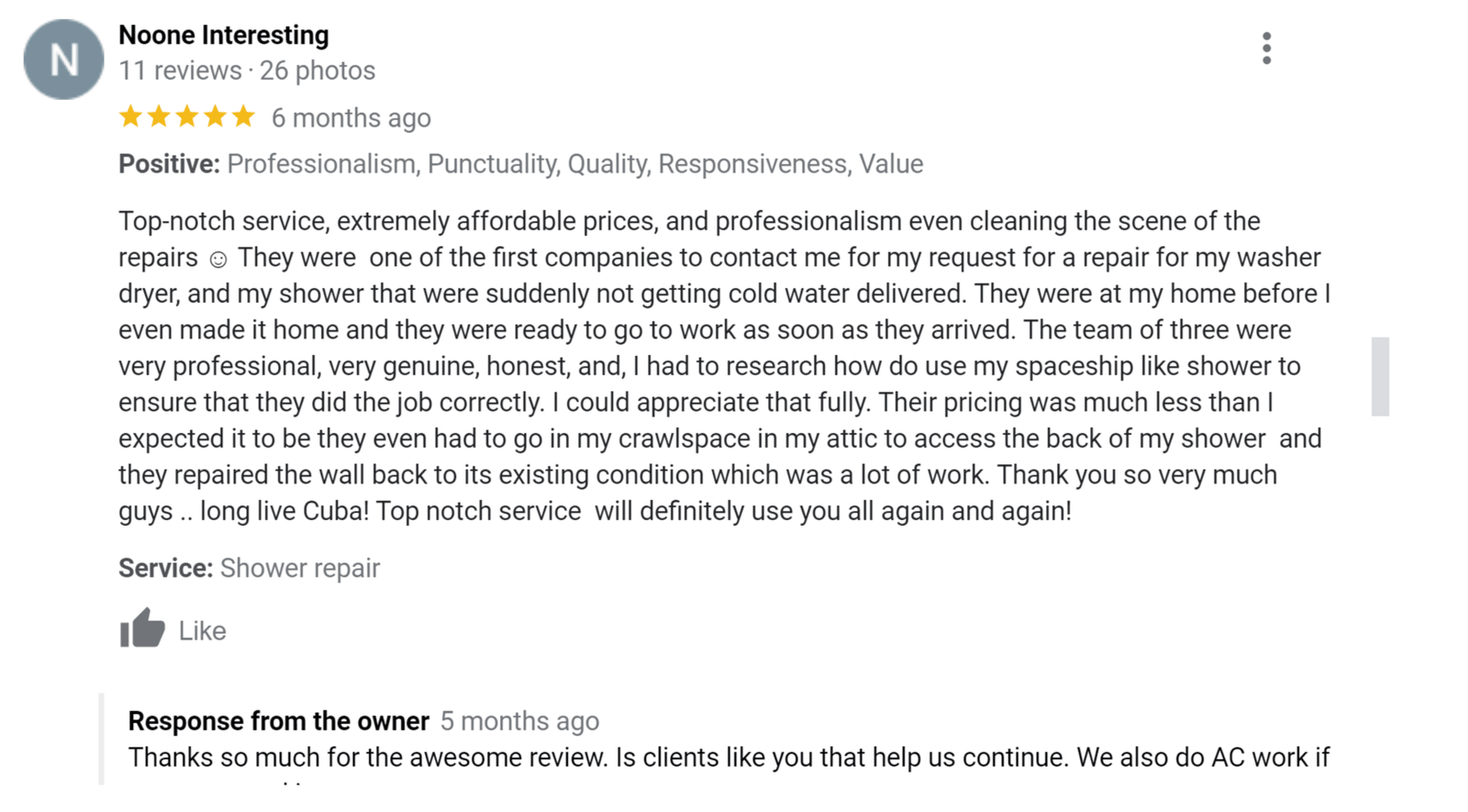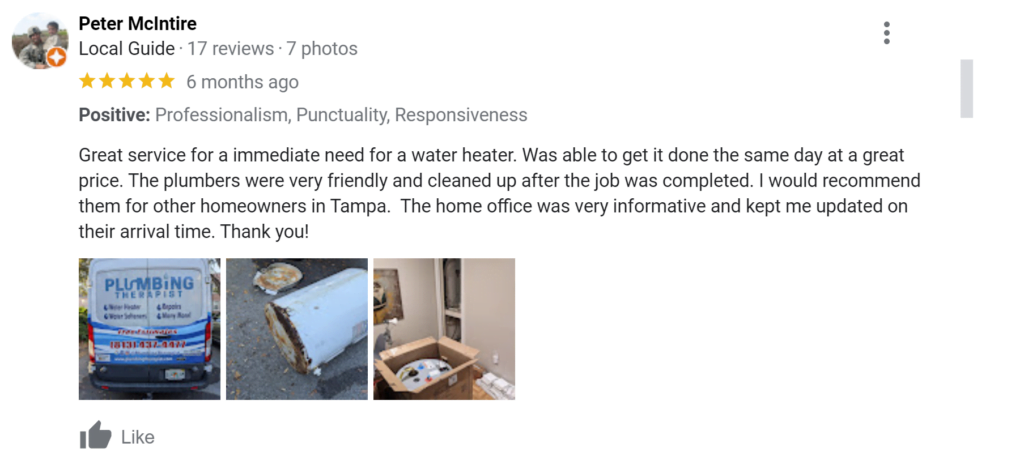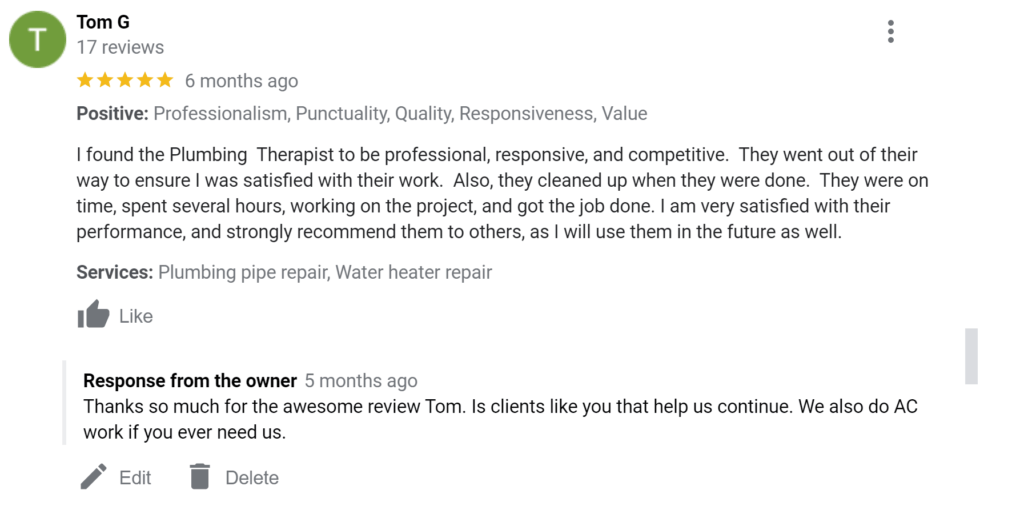Emergency Plumbing Services
Facing a plumbing emergency in Tampa Bay? Plumbing Therapist offers fast and reliable services for urgent issues like leaks and blockages. Get immediate, trustworthy solutions when you need them the most.
Do You Need Our Help ?
Feel free to contact us now
$99 Water Heater Flush + Free Plumbing System Inspection
Emergency Plumbing Services in Tampa Bay
Fast and Reliable Emergency Plumbing Services in Hillsborough County, Pinellas County, and Pasco County
Is a plumbing emergency wreaking havoc on your home or business? You’ve come to the right place. At Plumbing Therapists, we specialize in immediate, top-notch solutions for all your urgent plumbing needs in the Tampa Bay area.
Our Emergency Plumbing Services Include:
- Leak Repairs: Swift action to minimize water damage.
- Drain Unclogging: Effective solutions for stubborn blockages.
- Toilet Repairs: Resolving issues from overflow to malfunctioning parts.
- Water Heater Repairs: Restoring your hot water supply promptly.
- Pipe Replacements: Efficient service to replace corroded or burst pipes.
Why Choose Plumbing Therapists?
Prompt Response: When an emergency strikes, time is of the essence. We respond quickly to address the situation.
Skilled Technicians: Our team consists of experienced, licensed professionals committed to resolving your issue effectively.
Transparent Pricing: No hidden fees. We provide upfront pricing so you know exactly what to expect.

Why partner with Plumbing Therapist?
Quality, Affordability, and Expertise.

No Hidden or Unexpected Charges

Free Estimates & Online Booking Available

Professionally Trained Technicians

Honesty is Guaranteed

Quick Communication & Service Within 24 Hours

400+ 5 Star Reviews

How quickly should plumbing emergencies be attended to?
Plumbing emergencies should be attended to as quickly as possible, and the urgency often depends on the type and severity of the issue.
Types of Emergencies and Recommended Timelines:
1. Immediate Attention (within 1 hour or less):
- Burst Pipes, Major Leaks, Flooding: These issues can cause extensive water damage to the structure, furnishings, and electrical systems. Immediate action is crucial to minimize damage.
- Sewer Backup: This poses serious health hazards due to the potential presence of harmful bacteria and pathogens.
- Gas Leaks: Immediate evacuation and attention are essential due to the risk of fire or explosion. Contact emergency services immediately.
2. Urgent (within 2-4 hours):
- Clogged Drains, Overflow: This can quickly escalate, causing water damage and potential health issues.
- Hot Water Heater Failure: Lack of hot water can be disruptive and may indicate a larger problem that could worsen.
- Frozen Pipes: They can burst if not attended to, leading to significant water damage.
3. As Soon As Possible (within 24 hours):
- Slow Drains: These could be signs of a larger blockage issue.
- Minor Leaks: If left untreated, these can lead to mold, mildew, and structural damage over time.
- Running Toilets: Wasteful and could signify a more substantial issue with the plumbing system.
Why Quick Action is Important:
- Minimize Property Damage: Quick action can greatly reduce the amount of damage to your property.
- Health and Safety: Some plumbing issues can create an unsafe environment due to the risk of bacteria, mold, or even gas leaks.
- Cost-Effective: Addressing issues quickly often results in less complicated repairs, which can be more cost-effective in the long run.
- Prevent Escalation: Minor issues can turn into major problems if not promptly addressed.
Due to these factors, it’s imperative to tackle plumbing emergencies promptly with professional assistance.
If you would like more information, feel free to give them a call at (813)-437-4477 or you can book online and get their latest discount!
Customer Testimonials: Real Experiences with Plumbing Therapist
We proudly share the experiences and stories of our valued clients. Their feedback provides a glimpse into the quality of service and commitment to excellence we uphold at Plumbing Therapist. You'll read firsthand how our plumbing solutions have improved comfort and efficiency in homes across Tampa Bay. These testimonials illustrate our dedication to customer satisfaction and the difference our expert services can make.




Your questions answered
Common Emergency Plumbing Services Questions:
What qualifies as an emergency plumbing services?
An emergency plumbing services is generally a situation that requires immediate attention due to the risk it poses to your property, health, or safety. Here are some conditions that typically qualify as plumbing emergencies:
Major Leaks or Flooding
- Burst Pipes: Can lead to extensive water damage and electrical hazards.
- Water Heater Leaks: Especially if it’s leaking a significant amount rapidly.
Drainage Issues
- Sewer Backup: Sewage coming up from drains poses serious health risks.
- Severe Drain Clogs: If a clog is causing backups or overflows that risk water damage or expose you to sewage, it’s an emergency.
No Water Supply
- No Running Water: While not dangerous, a total loss of water supply is highly disruptive and often requires immediate attention.
Gas Leaks
- Smell of Gas in Property: This poses an immediate danger due to the risk of explosion or fire. Contact emergency services immediately.
Toilets
- Overflowing Toilet: An overflow that can’t be stopped will cause water damage and poses a health risk.
Hot Water
- Complete Loss of Hot Water: In cold conditions, this can pose a health risk, making it a priority to fix.
Other Factors
- Frozen Pipes: These can burst if not thawed, leading to significant issues.
- Strange Noises: Groaning or whistling noises from your plumbing may indicate a serious problem.
Safety Risks
- Contaminated Water: Signs of water contamination are serious and should be addressed immediately.
If you experience any of these issues, it’s crucial to contact a professional immediately to mitigate damage and risks.
What should I do while waiting for the plumber?
While waiting for the plumber to arrive during a plumbing emergency, there are some immediate actions you can take to mitigate damage and ensure safety. Here’s a quick guide:
Leaks and Flooding
Shut Off Water: Locate the main water valve and turn it off to stop further leaking. For minor leaks, you can also turn off the local shutoff valve typically located under sinks and behind toilets.
Contain Water: Use towels, buckets, or mops to soak up or redirect the water away from sensitive areas like electrical outlets and appliances.
Drainage Issues and Clogs
Avoid Usage: Don’t use any more water or flush toilets, as this can exacerbate the problem.
Attempt Basic Clearing: For minor clogs, you can try using a plunger to clear the obstruction, but avoid using chemical drain cleaners as they can cause more damage.
Toilets
Stop the Water: If the toilet is overflowing, try turning off the water supply valve usually located behind the toilet near the floor.
Use a Plunger: Try to clear any obvious obstructions using a plunger.
Gas Leaks
Evacuate: Leave the property immediately.
Contact Authorities: Call emergency services before calling a plumber for a gas leak.
No Water Supply
Check with Neighbors: Verify if the water supply issue is only affecting your property.
Inspect the Main Valve: Ensure the main water valve is turned on.
Hot Water Issues
- Turn Off the Heater: If your water heater is leaking or making strange noises, turn it off to avoid further damage or risk.
Safety Precautions
Keep Children and Pets Away: Ensure kids and pets are kept away from the affected area to avoid accidents.
Ventilate the Area: Open windows and doors if there’s a risk of sewer gases or if you’ve used any chemical products.
Remember, these are temporary measures to mitigate immediate risks and damage. A professional should be consulted for proper diagnosis and repair of plumbing issues.
How can I prevent a plumbing emergency?
Preventing a plumbing emergency involves a mix of regular maintenance, timely repairs, and general awareness of how your plumbing system works. Here are some tips to help you prevent plumbing emergencies:
Regular Maintenance
Scheduled Inspections: Have a professional inspect your plumbing system at least once a year. This can help identify potential issues before they become emergencies.
Drain Cleaning: Regularly clean out drains to prevent clogs. Avoid putting items like grease, hair, or hard-to-dissolve materials down the drain.
Check for Leaks: Periodically inspect faucets, pipes under sinks, and the water heater for small leaks or signs of wear and tear.
Flush Your Water Heater: Drain and flush the water heater annually to remove sediment, which can cause it to work harder and eventually fail.
Timely Repairs
Fix Small Leaks: Even a small leak can turn into a significant issue if left untreated.
Replace Old Pipes: If you live in an older home, consider replacing galvanized or lead pipes with modern materials like PVC or copper.
General Awareness
Know Your System: Familiarize yourself with the main water shut-off valve’s location in case you need to turn off the water supply quickly.
Avoid Chemical Drain Cleaners: These can corrode pipes over time, leading to leaks or breaks.
Be Careful with DIY: Understand your limitations when it comes to do-it-yourself plumbing repairs. Sometimes it’s best to call a professional.
Monitor Water Pressure: High water pressure can stress your pipes and lead to leaks. Install a pressure regulator if your pressure is consistently too high.
Cold Weather Precautions
Insulate Pipes: Pipes in unheated areas should be insulated to prevent freezing.
Drip Faucets: During extreme cold, let faucets drip slightly to keep water flowing and prevent freezing.
Implement Technology
Install Leak Detectors: Smart leak detectors can send alerts to your phone if a leak is detected, enabling quicker response.
Water Softeners: If you have hard water, a water softener can prevent sediment and mineral buildup in your pipes.
By adopting these preventive measures and staying vigilant, you can significantly reduce the risk of plumbing emergencies.
What maintenance should be regularly done to avoid emergencies?
Regular maintenance is key to avoiding a plumbing emergency. Here’s a comprehensive list of maintenance activities to keep your plumbing system in optimal condition:
General Plumbing
Scheduled Inspections: Hire a professional to inspect your entire plumbing system annually for any signs of wear and tear, corrosion, or potential issues.
Check for Leaks: Periodically check faucets, showerheads, and pipe joints for leaks. Even a small leak can escalate into a major problem.
Main Shut-off Valve: Periodically test the main shut-off valve to ensure it’s working correctly, so you can turn off the water supply quickly in case of emergencies.
Drains and Sewers
Regular Drain Cleaning: Clean sink, bathtub, and shower drains regularly to remove hair, soap scum, and other debris.
Sewer Line Inspection: If your home is older or you have trees near your sewer line, schedule an annual sewer line inspection.
Garbage Disposal: Clean your garbage disposal regularly and avoid disposing of items like grease or fibrous vegetables that can cause clogs.
Water Heater
Annual Flushing: Drain and flush the tank annually to remove sediment buildup, which can affect performance and lifespan.
Check Pressure Relief Valve: Test the pressure relief valve to ensure it’s operational.
Inspect for Corrosion: Periodically check the water heater for rust or corrosion, especially near the connections.
Toilets
Inspect Components: Check the flapper, fill valve, and flush handle periodically for wear and replace as necessary.
Check for Leaks: Add a few drops of food coloring to the tank; if the color appears in the bowl without flushing, you have a leak.
Cold Weather Maintenance
Pipe Insulation: Insulate exposed pipes in unheated areas to prevent freezing.
Faucet Drip: During extreme cold, allow faucets to drip slightly to prevent pipes from freezing.
Additional Tips
Water Pressure: Monitor your home’s water pressure with a gauge; high pressure can lead to leaks and pipe damage.
Hose Bibs: Inspect outdoor hose bibs for leaks or damage, particularly before and after winter.
Appliance Hoses: Check hoses on appliances like washing machines and dishwashers for cracks or leaks, replacing them as needed.
Sump Pump: If you have one, test it periodically to ensure it’s working correctly, especially before the rainy season.
By following these regular maintenance tasks, you can significantly reduce the risk of facing a plumbing emergency.
Is a slow leak an emergency?
A slow leak is generally not considered a plumbing emergency, but it shouldn’t be ignored. Over time, even a slow leak can cause significant water damage, lead to mold growth, and increase your water bill. Depending on the location and what’s leaking, it can also be a sign of a more significant issue in your plumbing system that could become an emergency if not addressed.
Why It’s Important to Address Slow Leaks:
Water Damage: Continued exposure to water can damage cabinets, floors, and walls.
Mold Growth: Persistent dampness is an ideal environment for mold, which can cause health problems.
Increased Costs: Slow leaks can add to your water bill over time, making it more expensive.
Potential for Escalation: What starts as a slow leak can turn into a major leak, causing more significant issues.
Waste of Resources: Letting water leak continuously is a waste of a valuable resource.
What to Do:
Locate the Source: Try to identify the source of the leak. It could be a faulty valve, a cracked pipe, or a deteriorating seal.
Contain the Leak: Use a bucket or towel to catch the dripping water to minimize water damage.
Turn Off Localized Water Supply: If possible, turn off the closest water valve to the leak.
Call a Plumber: Schedule a service call to assess the issue and make necessary repairs. While it may not be an emergency, it’s still a priority.
Regular Maintenance: Keep an eye out for leaks during your regular home maintenance to catch them before they become a bigger issue.
In summary, while a slow leak may not require immediate emergency service, it should be repaired as soon as possible to prevent further problems.
Is a dripping faucet considered an emergency?
A dripping faucet is generally not considered a plumbing emergency. While it can be annoying and wasteful, a dripping faucet usually doesn’t pose an immediate threat to your home or safety, unlike some other plumbing issues that qualify as emergencies, such as burst pipes or sewage backups.
However, it’s important not to ignore a dripping faucet entirely. Over time, what may seem like a minor annoyance can lead to larger problems that could escalate into an emergency. For example, the constant dripping can result in higher water bills, wasted resources, and even potential water damage over an extended period.
Additionally, a dripping faucet could be indicative of a larger issue within your plumbing system that could eventually turn into an emergency if not promptly addressed. Issues like deteriorating o-rings, washers, or valves can worsen over time and lead to bigger leaks, which may then qualify as an emergency.
In summary, while a dripping faucet is usually not an emergency, it’s important to get it fixed sooner rather than later to prevent it from becoming an emergency situation in the future.
How can I tell if a smell is a plumbing emergency?
Determining whether a smell constitutes a plumbing emergency can be challenging, as not all unpleasant odors indicate a serious issue. However, there are certain smells that should immediately raise red flags:
Signs that a Smell is a Plumbing Emergency:
Sewer Gas Smell: A rotten egg or sewage smell could indicate a sewer line break or backup, which is a serious health hazard and certainly an emergency.
Gas Smell: The smell of natural gas is a critical emergency. If you suspect a gas leak, evacuate immediately and call emergency services.
Electrical Burning Smell: While not strictly a plumbing issue, this could indicate an electrical problem with your water heater or sump pump, which is an emergency.
Strong Musty Smell: This could indicate a large mold build-up, possibly from a hidden leak, which should be addressed promptly.
Steps to Take:
Identify the Source: Try to identify where the smell is strongest to determine its source. Use caution and do not ignite any flames if you suspect a gas leak.
Shut Off Main Valve: If the smell is coming from a specific fixture or area, shut off the localized water supply if possible. If you suspect a gas leak, don’t touch any electrical switches and leave the main valve alone.
Ventilate the Area: Open windows and doors to disperse gas or sewer smells, but only if it’s safe to do so.
Call for Help: Contact a professional immediately if you believe the situation is an emergency. For gas leaks, call emergency services first.
Evacuate: If the smell is strong and you suspect it’s a gas or sewer leak, evacuate the premises immediately and wait for professional help.
In summary, not all unpleasant smells are emergencies, but some—like the smell of gas or sewer gas—should be treated as such. If in doubt, it’s better to err on the side of caution and consult with professionals to determine if you have a plumbing emergency on your hands.

